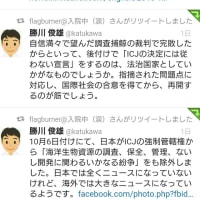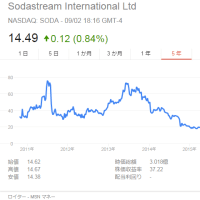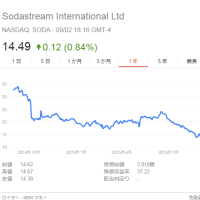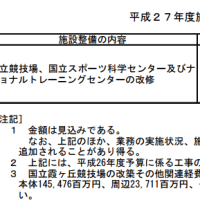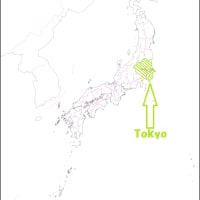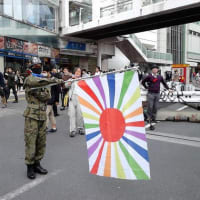昨日の夜というか今朝になって、国連総会の第3委員会(General Assembly Third Committee)が死刑の一時停止を加盟国に求める決議案を採択したのだが・・・。
・国連:「死刑一時停止」採択、日本は反対 総会第3委員会(2010年11月12日 毎日jp)
・UN committee urges death penalty halt, US opposed(2010年11月11日 in.reuters.com)
実は、2年間の国連総会でも同様の決議案が採択されたのよね。
ただし、日本政府はこの時決議案に反対していたけど。
これについては以下参照(手抜き)
・死刑制度なら日中で歩調が合うのね・・・(2008年12月20日 flagburner's blog(仮))
そして、昨日だか今朝だかの採決でも中国とともに決議案への反対票を投じた日本。
とりあえず、2010年11月12日毎日jp『国連:「死刑一時停止」採択~』を全文(略
--- 以下引用 ----
【ニューヨーク山科武司】
国連総会の第3委員会は11日、死刑執行の一時停止を加盟国に求める決議案を賛成多数で採択した。
決議採択は08年以来。
日本は反対した。
賛成は08年の総会より1カ国増えて107。
反対は日本や米国、中国、イラン、イラクなど38(08年総会46)、棄権は36(同34)だった。
---- 引用以上 ----
米国・中国・日本・・・。
世界の人口の2割以上を占めてる国が死刑制度一時停止に反対してる、という事実はどう受け止めればいいんだろうか?
しかも、反対した国々は前回とほとんど同じだし。
ってのはともかく。
この決議案については、死刑制度存続を主張する各国が修正案を出していた。
・Sixty-fifth General Assembly Third Committee 44th & 45th Meetings (AM & PM)(2010年11月11日 un.org)
修正案を出したのは、エジプト・ボツワナ・シンガポール。
3カ国の修正案に共通してるのは、死刑制度一時廃止について「あくまで各国の主権を優先する」という意味の文言だったが・・・。
以下、2010年11月11日分 un.org『Sixty-fifth General Assembly Third Committee~』から序盤部分を(略
---- 以下引用 ----
(中略)
The amendment proposed by Egypt was rejected by a vote of 62 in favour to 79 against, with 31 abstentions.
The amendment proposed by Botswana was rejected by a vote of 51 in favour to 81 against, with 33 abstentions.
Singapore’s amendment was rejected by a vote of 58 in favour to 79 against, with 30 abstentions.
The oral amendment offered by Bahamas was rejected by a vote of 54 in favour to 82 against, with 29 abstentions.
The representative of Chile, the main co-sponsor, noted how the draft — which he described as a balanced text — had drawn many co-sponsors from all regions of the world.
He emphasized the irreversible nature of the death penalty; the family of someone who had been mistakenly executed could be compensated, but the victim never could be.
He also noted how the first paragraph of the resolution was based on the principles and purposes of the Charter.
But, the representative of Egypt, the main sponsor of one of the amendments, said the jurisdiction of Member States was completely disregarded by the draft.
Several delegations had gone out of their way until the last minute to find a compromise that could accommodate everyone, but that efforts had fallen on deaf ears, he added.
The representative of the United States, noting the “robust debate” surrounding the issue, urged that a focus be placed on human rights violations liable to result from the improper application of the death penalty.
Her counterpart from China said that the draft was liable to create divisions and distrust, while failing to reflect the diversity of views on the issue in the international community.
Alluding to the large number of European countries co-sponsoring the draft, the representative of Rwanda said his country was “not yet” a member of the European Union, yet it was among the supporters of the draft.
(以下略)
---- 引用以上 ----
各国の主権の問題、ね。
o-kojo さんの言葉を借りると(またか)、「こと「死刑」と「捕鯨」については、多数意見ってないがしろにされがち」って所か(苦笑)。
この辺については以下参照(手抜き)
・[よのなか]血に飢えた人たちPart2(2010年11月12日 おこじょの日記)
とはいえ、昨日だか今日の第3委員会で一番暴れていた(?)のはエジプト。
なんせ、修正案提出をした上、発言録が結構な量にもなったし・・・(なんか違う)
ともかく、決議案の採択後、エジプト国連大使(多分)は意味深なことを語っていた。
以下、2010年11月11日 un.org『Sixty-fifth General Assembly Third Committee~』から決議案投票後におけるエジプト国連大使(多分)の発言を(略
---- 以下引用 ----
(中略)
The representative of Egypt said that, despite sincere calls to improve the language of the resolution in line with existing human rights instruments, the country’s calls were not heeded.
It was unfortunate that, during the course of deliberations, the rejection of selective quotations was highlighted.
Yet, selective quotations were used when it served particular objectives and, further, interpretations were added.
A blind eye was turned to the fact that the resolution was selective in scope.
Egypt respected the United Nations Charter and the fact that not all rules were suitable everywhere.
Member States had the right to maintain the death penalty for the most serious crimes.
If there was a trend towards the abolition of the death penalty, one could only wonder why so many States voted in favour of the amendments just considered.
The only trend was the departure from beliefs that the United Nations held sacred and supporting one side, while ignoring the other.
In light of all that, Egypt would vote against the resolution.
(中略)
The representative of Egypt said that he had voted against the resolution, but it remained an obligation of States that imposed the death penalty that it should only be carried out by a competent court of law and through due process.
Egypt was of the view the focus should be on an international commitment to make sure that nobody was arbitrarily deprived their right to life.
The resolution dealt with only one aspect of the right to life, and that selectivity in accepting which norms to highlight and which to not use was very apparent in certain parts of the text.
It overlooked the fact that no one single interpretation should be forced on to the international community.
Any resolution should adhere to international laws and human rights instruments.
Attempts to ignore one side while upholding the other showed a double standard, which was a precedent that was detrimental to international law
---- 引用以上 ----
言いたい放題だな~(謎笑)
つーか、決議案が生きる権利「だけ」焦点を当てたって・・・どんだけエジプト政府が現状の制度を維持したいのかを伺わせる発言だわな。
だいたい、国際法とかの「つまみ食い」ってのはエジプト政府などもやってるだろうに(何)
そこから今回採択された決議案を非難しても、あんまり効果はないと思うのだが・・・。
ちなみに、昨日だか今日の第3委員会で日本の国連大使(多分)もなかなか妙なことをのたまっていた。
以下、2010年11月11日分 un.org『Sixty-fifth General Assembly Third Committee~』から決議案投票後に行われた日本の国連大使(多分)の発言を(略
---- 以下引用 ----
(中略)
In an explanation of the vote, the representative of Japan said the country had voted against the resolution, because it was of the view that it was up to each Member State to make decisions concerning the death penalty, including establishing a moratorium.
This decision should be based on several careful considerations, including public opinion, trends in serious crimes and the need for holistic balance.
The retention of the death penalty was supported by an overwhelming majority of the Japanese public.
The public opinion on this issue should be respected, so Japan had not taken a view counter to its public.
Japan also noted that no international consensus existed on the issue, thus it was deeply regrettable that the sponsors had decided to table this issue notwithstanding strong opposition from States.
(以下略)
---- 引用以上 ----
死刑制度廃止に関して国際的な合意がないって・・・。
単に、日本政府が死刑制度を本音では存続させたいのを隠す発言な気がする(怒)
・国連:「死刑一時停止」採択、日本は反対 総会第3委員会(2010年11月12日 毎日jp)
・UN committee urges death penalty halt, US opposed(2010年11月11日 in.reuters.com)
実は、2年間の国連総会でも同様の決議案が採択されたのよね。
ただし、日本政府はこの時決議案に反対していたけど。
これについては以下参照(手抜き)
・死刑制度なら日中で歩調が合うのね・・・(2008年12月20日 flagburner's blog(仮))
そして、昨日だか今朝だかの採決でも中国とともに決議案への反対票を投じた日本。
とりあえず、2010年11月12日毎日jp『国連:「死刑一時停止」採択~』を全文(略
--- 以下引用 ----
【ニューヨーク山科武司】
国連総会の第3委員会は11日、死刑執行の一時停止を加盟国に求める決議案を賛成多数で採択した。
決議採択は08年以来。
日本は反対した。
賛成は08年の総会より1カ国増えて107。
反対は日本や米国、中国、イラン、イラクなど38(08年総会46)、棄権は36(同34)だった。
---- 引用以上 ----
米国・中国・日本・・・。
世界の人口の2割以上を占めてる国が死刑制度一時停止に反対してる、という事実はどう受け止めればいいんだろうか?
しかも、反対した国々は前回とほとんど同じだし。
ってのはともかく。
この決議案については、死刑制度存続を主張する各国が修正案を出していた。
・Sixty-fifth General Assembly Third Committee 44th & 45th Meetings (AM & PM)(2010年11月11日 un.org)
修正案を出したのは、エジプト・ボツワナ・シンガポール。
3カ国の修正案に共通してるのは、死刑制度一時廃止について「あくまで各国の主権を優先する」という意味の文言だったが・・・。
以下、2010年11月11日分 un.org『Sixty-fifth General Assembly Third Committee~』から序盤部分を(略
---- 以下引用 ----
(中略)
The amendment proposed by Egypt was rejected by a vote of 62 in favour to 79 against, with 31 abstentions.
The amendment proposed by Botswana was rejected by a vote of 51 in favour to 81 against, with 33 abstentions.
Singapore’s amendment was rejected by a vote of 58 in favour to 79 against, with 30 abstentions.
The oral amendment offered by Bahamas was rejected by a vote of 54 in favour to 82 against, with 29 abstentions.
The representative of Chile, the main co-sponsor, noted how the draft — which he described as a balanced text — had drawn many co-sponsors from all regions of the world.
He emphasized the irreversible nature of the death penalty; the family of someone who had been mistakenly executed could be compensated, but the victim never could be.
He also noted how the first paragraph of the resolution was based on the principles and purposes of the Charter.
But, the representative of Egypt, the main sponsor of one of the amendments, said the jurisdiction of Member States was completely disregarded by the draft.
Several delegations had gone out of their way until the last minute to find a compromise that could accommodate everyone, but that efforts had fallen on deaf ears, he added.
The representative of the United States, noting the “robust debate” surrounding the issue, urged that a focus be placed on human rights violations liable to result from the improper application of the death penalty.
Her counterpart from China said that the draft was liable to create divisions and distrust, while failing to reflect the diversity of views on the issue in the international community.
Alluding to the large number of European countries co-sponsoring the draft, the representative of Rwanda said his country was “not yet” a member of the European Union, yet it was among the supporters of the draft.
(以下略)
---- 引用以上 ----
各国の主権の問題、ね。
o-kojo さんの言葉を借りると(またか)、「こと「死刑」と「捕鯨」については、多数意見ってないがしろにされがち」って所か(苦笑)。
この辺については以下参照(手抜き)
・[よのなか]血に飢えた人たちPart2(2010年11月12日 おこじょの日記)
とはいえ、昨日だか今日の第3委員会で一番暴れていた(?)のはエジプト。
なんせ、修正案提出をした上、発言録が結構な量にもなったし・・・(なんか違う)
ともかく、決議案の採択後、エジプト国連大使(多分)は意味深なことを語っていた。
以下、2010年11月11日 un.org『Sixty-fifth General Assembly Third Committee~』から決議案投票後におけるエジプト国連大使(多分)の発言を(略
---- 以下引用 ----
(中略)
The representative of Egypt said that, despite sincere calls to improve the language of the resolution in line with existing human rights instruments, the country’s calls were not heeded.
It was unfortunate that, during the course of deliberations, the rejection of selective quotations was highlighted.
Yet, selective quotations were used when it served particular objectives and, further, interpretations were added.
A blind eye was turned to the fact that the resolution was selective in scope.
Egypt respected the United Nations Charter and the fact that not all rules were suitable everywhere.
Member States had the right to maintain the death penalty for the most serious crimes.
If there was a trend towards the abolition of the death penalty, one could only wonder why so many States voted in favour of the amendments just considered.
The only trend was the departure from beliefs that the United Nations held sacred and supporting one side, while ignoring the other.
In light of all that, Egypt would vote against the resolution.
(中略)
The representative of Egypt said that he had voted against the resolution, but it remained an obligation of States that imposed the death penalty that it should only be carried out by a competent court of law and through due process.
Egypt was of the view the focus should be on an international commitment to make sure that nobody was arbitrarily deprived their right to life.
The resolution dealt with only one aspect of the right to life, and that selectivity in accepting which norms to highlight and which to not use was very apparent in certain parts of the text.
It overlooked the fact that no one single interpretation should be forced on to the international community.
Any resolution should adhere to international laws and human rights instruments.
Attempts to ignore one side while upholding the other showed a double standard, which was a precedent that was detrimental to international law
---- 引用以上 ----
言いたい放題だな~(謎笑)
つーか、決議案が生きる権利「だけ」焦点を当てたって・・・どんだけエジプト政府が現状の制度を維持したいのかを伺わせる発言だわな。
だいたい、国際法とかの「つまみ食い」ってのはエジプト政府などもやってるだろうに(何)
そこから今回採択された決議案を非難しても、あんまり効果はないと思うのだが・・・。
ちなみに、昨日だか今日の第3委員会で日本の国連大使(多分)もなかなか妙なことをのたまっていた。
以下、2010年11月11日分 un.org『Sixty-fifth General Assembly Third Committee~』から決議案投票後に行われた日本の国連大使(多分)の発言を(略
---- 以下引用 ----
(中略)
In an explanation of the vote, the representative of Japan said the country had voted against the resolution, because it was of the view that it was up to each Member State to make decisions concerning the death penalty, including establishing a moratorium.
This decision should be based on several careful considerations, including public opinion, trends in serious crimes and the need for holistic balance.
The retention of the death penalty was supported by an overwhelming majority of the Japanese public.
The public opinion on this issue should be respected, so Japan had not taken a view counter to its public.
Japan also noted that no international consensus existed on the issue, thus it was deeply regrettable that the sponsors had decided to table this issue notwithstanding strong opposition from States.
(以下略)
---- 引用以上 ----
死刑制度廃止に関して国際的な合意がないって・・・。
単に、日本政府が死刑制度を本音では存続させたいのを隠す発言な気がする(怒)











